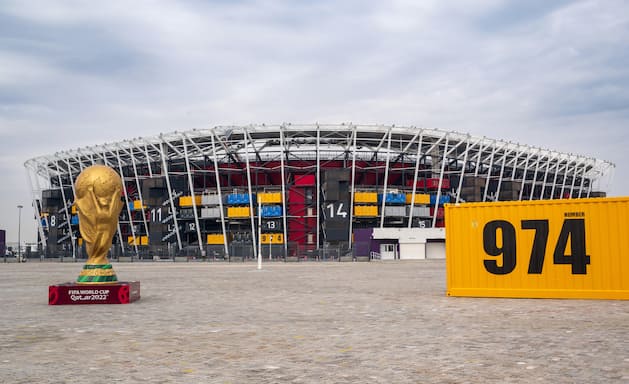The colorful World Cup flags flutter unchanged in the wind on the multi-lane main roads. The World Cup mascot “La’eeb” is still omnipresent on huge advertising walls and banners in Qatar’s capital Doha. The glittering facades of the skyscrapers continue to be illuminated in the evenings with huge pictures of football stars such as England’s Harry Kane or Holland’s Virgil van Dijk.
Of course, the imposing stadiums such as the Lusail arena, which can hold almost 90,000 spectators, are still standing, mostly empty or isolated in the desert sand. They are mementos of a prodigal tournament in a state brimming with wealth. The “Stadium 974”, named after Qatar’s country code and the number of containers used for construction, looks pretty empty from the outside.
Workers are on duty. A fashion show was held there after seven World Cup games. The 974 containers are now to be dismantled. A park is planned at some point on the huge site.
In Caravan City, which served as a fan camp, the yellow entrance gate is still in the dust. Also a few caravans, water tanks and an empty supermarket container from the grocery chain “Al Meera”.
At the entrances to the metro, the long lettering “Celebrate” is emblazoned. But Qatar’s football party is over. The emirate was not a football country before – and the World Cup has not made it one. Qatar’s national team lost three times and was eliminated.
The Qatar Stars League is now playing in front of a few spectators again. The Al Shamal Stadium with the red towers, where Hansi Flick held the few secret training sessions for the DFB selection, is again the home of the Al Shamal Sports Club.
For weeks, thousands of fans from Argentina, Morocco and Mexico shaped the colorful scene in the Souq Waqif, where the usual business and social activities are now taking place again. “Normal life is back,” says taxi driver Ebenezer.
He comes from Ghana and has been living in Qatar for seven years. In addition to his job, he was right in the middle of it as a World Cup volunteer. “We experienced the best World Cup, that helped the country,” says Ebenezer proudly. He was even allowed to watch a game in the stadium: Ghana vs Portugal. After the 2: 3 of his home country, he still scolds the referee.
“Gold-Rosi” Mittermaier is dead. The winter sports athlete died at the age of 72 after a serious illness. “Gold-Rosi” won two gold medals for Germany at the 1976 Winter Olympics.
Gabriel Clemens is the first German darts professional to make it to the semi-finals of the World Cup. This is not only a sporting success, but also brings a warm shower of money. As a darts professional, financial survival is otherwise difficult.








